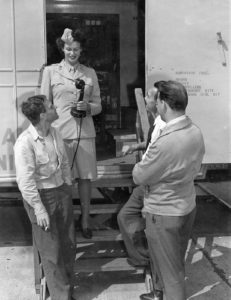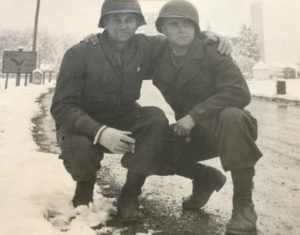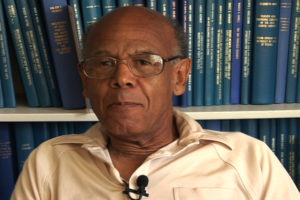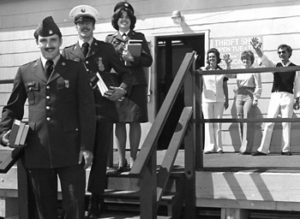From the Director:
Preserving Veteran Experiences for Future Generations
It was the 11th hour on the 11th day of the 11th month that the armistice ending World War I took effect. In the ensuing years this was celebrated, first, as Armistice Day, and, now, as Veteran’s Day. On this day we commemorate and remember those men and women who have served in the armed forces. Although the Oral History Center has no “veteran’s oral history project” per se, we proudly have documented the lives and service of hundreds of military men and women in multiple projects throughout our collection, and in observance of this year’s holiday, we’d like to highlight some of those for you here.
When the Oral History Center was established sixty-five years ago, World War I already was nearly forty years in the past. I was not able to locate any oral histories in our collection with those who served in the US military at that time, but the life and times of The Great War does appear in our interviews, and from some pretty interesting angles too. Our 1987 interview with Charles Blaisdell, Jr. offers a view into immediate prewar Germany, around the time of the 100th anniversary of the Battle of Waterloo, as well as his observations of World War I from outposts in India and China. A memoir from 1976 provides another unique perspective on World War I, this time from a young man living in pre-Soviet Russia, Ivan Stenbock-Fermor.

The collection becomes much more substantial in its coverage of World War II, both of those who served in the military and who assisted with the homefront effort. Of the latter group, any serious researcher must contend with the Rosie the Riveter / World War II Home Front oral history project. This project, completed only in the last few years, is OHC’s largest project to date, resulting in hundreds of individual interviews. Along with scores of interviews with those who worked in wartime industries, this project also features a handful of interviews with women who served in the military, such as army recruiter Mary Cohen, who later went on to place veterans in jobs; or served in some auxiliary role, such as Anita Christiansen and Mary Highfill, both of whom volunteered with the USO; or Grahame Crichton Coffey, who joined the Women Accepted for Volunteer Emergency Service (WAVES) in 1943 and continued her service for the duration of the war.

In dozens of additional interviews, men detail their service in the war and bravery in many of the great battles. Walter Newman, for example, provides a harrowing, awe-inspiring account of the Invasion of Normandy in June 1944; around the town of Saint Lo, Newman was shot through the lung and gravely injured, spending many months hospitalized (see the video below). He recuperated fully and went on to work for the welfare of veterans throughout his life and was even honored with the French Legion of Honor medal in 2009. Our recent oral history with UC Berkeley Mechanical Engineering Professor George Leitmann also offers a riveting first-person account of the Battle of Colmar and the liberation of Europe. The fact that both Newman and Leitmann were young Jews fighting the Nazis adds an extra dimension to these dramatic tales.

The story of American veterans did not end with World War II, and the OHC collection includes scores of oral histories with those who have served in Korea, Vietnam, and the Gulf War, among other conflicts. Our project documenting the history of the Oakland Army Base includes interviews covering all of these conflicts, but has a special focus on the Korean War and Vietnam War eras, the time at which the base was the largest military port operation in the world. Gordon Coleman, an Oakland native and graduate of UC Berkeley, served in Korea in the immediate wake of the ceasefire. George Bolton, who was interviewed for this project, was raised in Oakland and was drafted into the army in 1963 where he served for two years, including some time in these early years of the Vietnam War. Grant Davis served in the Air Force during the Vietnam War, and then went on to have a civilian career at the Oakland Army Base. All three men speak about their military careers from the perspective of African Americans who experienced integration, and racism, while in the service.

These interviews are just one way — perhaps only one small way — in which the Oral History Center, and by extension UC Berkeley, chooses to honor our veterans and remember their service to our country. Further, we are aware that those whom we had the chance to interview were those who survived the battles, the wars, and the hardships; they returned home, but many others did not. Because they are the ones who lived to tell those stories, we take seriously our role in preserving them for you and future generations to hear.
Martin Meeker
Charles B. Faulhaber Director
Oral History Center, The Bancroft Library